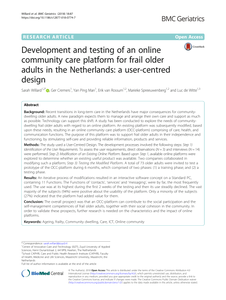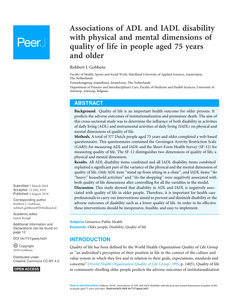Background: Recent transitions in long-term care in the Netherlands have major consequences for community- dwelling older adults. A new paradigm expects them to manage and arrange their own care and support as much as possible. Technology can support this shift. A study has been conducted to explore the needs of community- dwelling frail older adults with regard to an online platform. An existing platform was subsequently modified, based upon these needs, resulting in an online community care platform (OCC-platform) comprising of care, health, and communication functions. The purpose of this platform was to support frail older adults in their independence and functioning, by stimulating self-care and providing reliable information, products and services. Methods: The study used a User-Centred Design. The development processes involved the following steps: Step 1) Identification of the User Requirements. To assess the user requirements, direct observations (N = 3) and interviews (N = 14) were performed. Step 2) Modification of an Existing Online Platform. Based upon Step 1, available online platforms were explored to determine whether an existing useful product was available. Two companies collaborated in modifying such a platform; Step 3) Testing the Modified Platform. A total of 73 older adults were invited to test a prototype of the OCC-platform during 6 months, which comprised of two phases: (1) a training phase; and (2) a testing phase. Results: An iterative process of modifications resulted in an interactive software concept on a Standard PC, containing 11 Functions. The Functions of ‘contacts’, ‘services’ and ‘messaging’, were by far, the most frequently used. The use was at its highest during the first 2 weeks of the testing and then its use steadily declined. The vast majority of the subjects (94%) were positive about the usability of the platform. Only a minority of the subjects (27%) indicated that the platform had added value for them. Conclusion: The overall prospect was that an OCC-platform can contribute to the social participation and the self-management competencies of frail older adults, together with their social cohesion in the community. In order to validate these prospects, further research is needed on the characteristics and the impact of online platforms.
MULTIFILE

The aim of this research is to explore the potential of Mixed Reality (MR) technologies for Operator Support in order to progress towards Industry 4.0 (I4.0) particularly for SMEs. Through a series of interventions and interviews conducted with local SMEs, potential use cases and their drawbacks have been identified. From this, insights were derived that serve as a starting point for conducting further experiments with MR technology in the smart manufacturing laboratory at the THUAS in Delft. The intervention consisted of a free form workshop in which the participants get ‘tinkering’ time to explore MR in their own work environment. The various levels of awareness were assessed in three stages: during an introductory interview, and after an instruction meeting and some ‘tinkering’. The study took place in the period from January 2022 to July 2022 with 10 local SMEs in the Netherlands. The results show that for all SMEs the awareness and understanding increased. The use cases identified by operators themselves concerned Quality Control, Diagnostics, Instruction, Specification and Improvement of Operations. Drawbacks foreseen related to Ergonomic Concerns, Resistance from operators, Technical considerations, Unavailability of MR device and an insufficient digital infrastructure to support MR in full extent. The use case most promising to the participants was further developed into a physical prototype for an ‘assisted assembly cell’ by which the aspects of ergonomics and the mentioned technical considerations could be analysed.
MULTIFILE

In dit proefschrift worden de resultaten beschreven van een studie die online wijkplatformen voor thuiswonende ouderen evalueert die werden ontwikkeld op basis van wensen en behoeften van eindgebruikers. Middels deze online wijkplatformen worden ouderen gestimuleerd om maatschappelijk te participeren en wordt gepoogd om in wijken vraag en aanbod van inwoners bij elkaar te brengen. Via deze online platformen kunnen wijkbewoners, zo ook thuiswonende ouderen, verschillende applicaties raadplegen.
DOCUMENT

Recent studies on urban policy responses to increasing tourism have moved beyond the physical impact of tourism to also include the way tourism is framed by social movements. This paper contributes to this line of research with a focus on frame resonance: the extent to which frames strike a responsive chord with the public in general and policymakers in particular. We introduce a specific form of frame amplification through cultural resonance; the appeal to pre-existing societal beliefs. Using an analysis of policy documents, print, online and social media, we demonstrate that frames around tourist shops in Amsterdam appealed to pre-existing beliefs that portray the inner city as: a delicate mix of functions, an infrastructure for criminal activities, and a business card reflecting the city’s quality of place. These beliefs amplified frame resonance to such an extent that they convinced an initially reluctant local government to ban tourist shops from the inner city, a policy that undermines the accessibility and inclusivity of urban spaces that the local government aims to promote (SDG 11). This suggests that the contingencies in the local context that enable or foreclose the cultural resonance of frames are essential in understanding policy responses to touristification.
DOCUMENT

This article will discuss philosophical debates on economic growth and environmental sustainability, the role of management responsibility, and the risk of subversion to business as usual. This discussion will be framed using the concepts of Cradle to Cradle (C2C) and Circular Economy about sustainable production. The case study illustrating the danger of subversion of these progressive models discussed here is based on the assignments submitted by Masters students as part of a course related to sustainable production and consumption at Leiden University. The evaluation of the supposedly best practice cases placed on the website of the Ellen MacArthur Foundation or those awarded Cradle to Cradle certificate has led some students to conclude that these cases illustrated green-washing. Larger implications of identified cases of green-washing for the field of sustainable business and ecological management are discussed. “This is a post-peer-review, pre-copyedit version of an article published in 'Philosophy of Management'. The final authenticated version is available online at: https://doi.org/10.1007/s40926-019-00108-x LinkedIn: https://www.linkedin.com/in/helenkopnina/
MULTIFILE

Background. Quality of life is an important health outcome for older persons. It predicts the adverse outcomes of institutionalization and premature death. The aim of this cross-sectional study was to determine the influence of both disability in activities of daily living (ADL) and instrumental activities of daily living (IADL) on physical and mental dimensions of quality of life. Methods. A total of 377 Dutch people aged 75 years and older completed a web-based questionnaire. This questionnaire contained the Groningen Activity Restriction Scale (GARS) for measuring ADL and IADL and the Short-Form Health Survey (SF-12) for measuring quality of life. The SF-12 distinguishes two dimensions of quality of life, a physical and mental dimension.
DOCUMENT

During the first half of 2020, the outbreak of the COVID-19 virus had a huge global impact. The physical health of many was (often severely) threatened and affected, resulting in numerous deaths. Furthermore, all aspects of human coexistence came under pressure, such as economic activities and material living conditions, psychological well-being and social contacts, human rights and democratic decision-making, international political relations and global solidarity. As in other parts of the world, COVID-19 kept the Netherlands in its grip.In this article we would like to address the following questions:-What impact did pandemic and policy have on Dutch social work education and how was this experienced by students?-What was the impact of pandemic and policy on social work practices and what were its challenges for social professionals?-What does this all mean for the future of social work education, since it has to take the present concerns of students into account as well as prepare them for social work practice in the near future?
DOCUMENT

In dit rapport zijn vier scenario’s uitgewerkt. Elk van de scenario´s kan zich in de toekomst meer of minder ontvouwen. Deze vier scenario´s vormen de inspiratiepaden die elk verschillende kansen en belemmeringen in zich hebben en daarmee mogelijkheden voor de toekomst bieden. Per scenario wordt beschreven wat de essentiële verschillen per route zijn.
DOCUMENT

Like a marker pen on a map, the Covid-19 pandemic drastically highlighted the persisting existence of borders that used to play an ever decreasing role in people´s perception and behavior over the last decades. Yes, inner European borders are open in normal times. Yes, people, goods, services and ideas are crossing the border between Germany and the Netherlands freely. Yet we see that the border can turn into a barrier again quickly and effectively and it does so in many dimensions, some of them being not easily visible. Barriers hinder growth, development and exchange and in spite of our progress in creating a borderless Europe, borders still create barriers in many domains. Differing labor law, social security and tax systems, heterogeneous education models, small and big cultural differences, language barriers and more can impose severe limitations on people and businesses as they cross the border to travel, shop, work, hire, produce, buy, sell, study and research. Borders are of all times and will therefore always exist. But as they did so for a long time, huge opportunities can be found in overcoming the barriers they create. The border must not necessarily be a dividing line between two systems. It has the potential to become a center of growth and progress that build on joint efforts, cross-border cooperation, mutual learning and healthy competition. Developing this inherent potential of border regions asks for politics, businesses and research & education on both sides of the border to work together. The research group Cross-Border Business Development at Fontys University of Applied Science in Venlo conducts applied research on the impact of the national border on people and businesses in the Dutch-German border area. Students, employees, border commuters, entrepreneurs and employers all face opportunities as well as challenges due to the border. In collaboration with these stakeholders, the research chair aims to create knowledge and provide solutions towards a Dutch-German labor market, an innovative Dutch-German borderland and a futureproof Cross-Border economic ecosystem. This collection is not about the borderland in times of COVID-19. Giving meaning to the borderland is an ongoing process that started long before the pandemic and will continue far beyond. The links that have been established across the border and those that will in the future are multifaceted and so are the topics in this collection. Vincent Pijnenburg outlines a broader and introductory perspective on the dynamics in the Dutch-German borderland.. Carla Arts observes shopping behavior of cross-border consumers in the Euregion Rhine-Meuse-North. Jan Lucas explores the interdependencies of the Dutch and German economies. Jean Louis Steevensz presents a cross-border co-creation servitization project between a Dutch supplier and a German customer. Vincent Pijnenburg and Patrick Szillat analyze the exitence of clusters in the Dutch-German borderland. Christina Masch and Janina Ulrich provide research on students job search preferences with a focus on the cross-border labor market. Sonja Floto-Stammen and Natalia Naranjo-Guevara contribute a study of the market for insect-based food in Germany and the Netherlands. Niklas Meisel investigates the differences in the German and Dutch response to the Covid-19 crisis. Finally, Tolga Yildiz and Patrick Szillat show differences in product-orientation and customer-orientation between Dutch and German small and medium sized companies. This collection shows how rich and different the links across the border are and how manifold the perspectives and fields for a cross-border approach to regional development can be. This publication is as well an invitation. Grasping the opportunities that the border location entails requires cooperation across professional fields and scientific disciplines, between politics, business and researchers. It needs the contact with and the contribution of the people in the region. So do what we strive for with our cross-border research agenda: connect!
DOCUMENT
